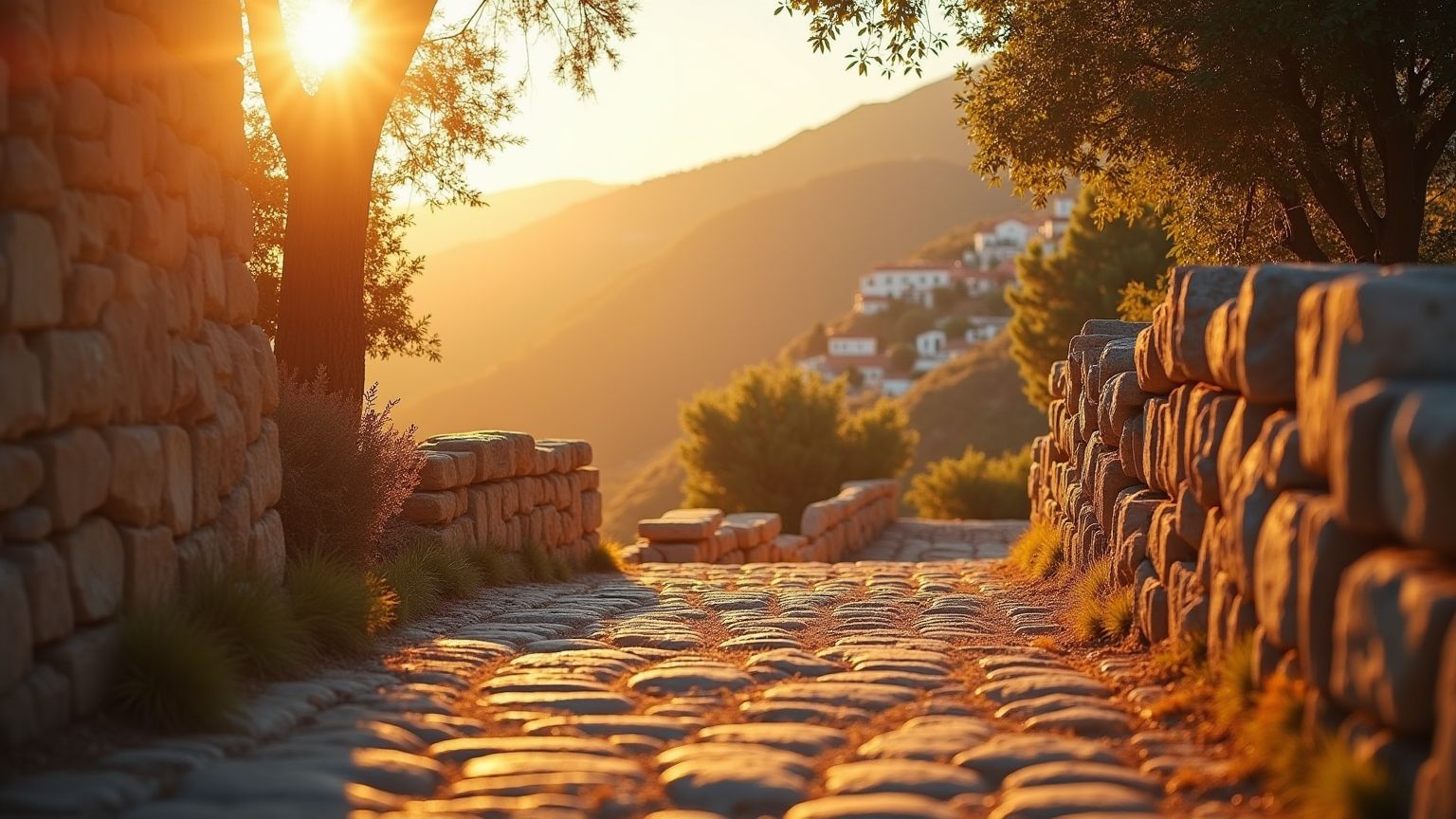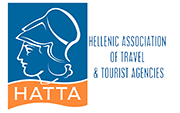Nemea Greece: Ancient Battles & Modern Wines in Greece’s Hidden Gem
Let me spill the beans about Nemea, Greece - this place has been my professional playground for 15 years now. Trust me when I say there's something magical about watching visitors' jaws drop when those ancient columns come into view, rising dramatically from the valley floor like stone giants from another time. Yet somehow, Nemea Greece remains that rare treasure that hasn't been overrun by selfie sticks and tour buses.
Nemea Greece deserves way more love than it gets. Where else can you literally walk the same path as Heracles (Hercules for you Roman mythology fans), sip extraordinary wines right where they're born, and experience Greeks being Greek without the madness of Athens or the Instagram parade of Santorini? Let me be your virtual guide through this special corner of the Peloponnese.
A Brief History: Myths, Lions, and Ancient Athletes
The story of Nemea begins with a beast. Legend has it that this valley is where Heracles wrestled that infamous Nemean Lion – a terrifying creature whose skin no weapon could penetrate. After strangling the beast with his bare hands (talk about hand-to-hand combat skills!), he wore its invincible hide as his signature outfit for the rest of his monster-hunting career.
But Nemea isn't just mythological bedtime stories. From the 6th century BCE until 271 BCE, this valley hosted the Nemean Games – a major sporting festival that stood shoulder-to-shoulder with the Olympics. Every two years, athletes from across the Greek world converged here, their city-states temporarily putting aside their squabbles so everyone could travel safely to watch sweaty men compete in footraces, wrestling, and other athletic pursuits.
After the Romans shifted the games to Argos, Nemea Greece retreated into the background, becoming just another farming valley. It wasn't until the 1970s that Professor Stephen Miller from UC Berkeley started digging here in earnest, unearthing the remarkable site we can explore today.
Getting to Nemea: Your Practical Guide
Nemea Greece sits about 120 kilometers southwest of Athens in the northeastern Peloponnese. Here's how to get your boots on this historic ground:
By Car (My Strong Recommendation)
- From Athens: Cruise down the highway toward Corinth (roughly an hour), then follow signs to Nemea (another 30 minutes). Even the most directionally-challenged travelers can handle this drive.
- From Nafplio: A gorgeous 45-minute journey through vineyards that'll have you stopping for photos every five minutes.
Local Whisper: Rent wheels if you can. The freedom to explore both the ruins and wineries of Nemea Greece at your own pace is priceless. Plus, there are tiny mountain villages nearby where grandmas still make cheese the old-fashioned way – only accessible if you've got your own transportation.
By Bus
KTEL buses trudge from Athens' Kifissos Bus Terminal to Nemea Greece in about 2 hours. Fair warning: there are usually only 2-3 departures daily, and the schedule seems to be written in pencil rather than stone. Check KTEL Korinthias before banking on this option.
By Organized Tour
Various companies in Athens and Nafplio bundle Nemea Greece with places like Mycenae or Corinth. Convenient? Yes. Flexible? About as flexible as Greek bureaucracy. You'll get transportation and guided commentary but sacrifice the freedom to linger where your heart desires.
Inside Scoop: If you're bunking in Nafplio (which is a fantastic idea for exploring this region), several local operators run half-day excursions focusing just on the wines and ruins of Nemea Greece. These folks know their stuff.
When to Visit: Seasonal Considerations

Nemea Greece welcomes visitors all year, but each season brings its own flavor:
Spring (April-June)
This is when I love showing people around Nemea Greece most. The archaeological site explodes with red poppies and yellow wildflowers, temperatures hover at a perfect 18-25°C, and the vines wake up from their winter nap. Best of all? The tourist hordes haven't descended yet, giving you space to commune with ancient spirits in peace.
Summer (July-August)
Busy and blazing hot in Nemea Greece. Thermometers regularly push past 32°C, so if you visit, get to the ruins early unless you fancy impersonating a slow-roasted souvlaki. The upside is longer opening hours and occasional cultural events, including the rare revival of the ancient games.
Autumn (September-October)
Harvest season brings Nemea Greece alive with grape-stained fingers and celebratory drinking. Wine festivals pop up like mushrooms after rain, and the weather cools to "just right" again. Wine lovers, this is your moment.
Winter (November-March)
The quiet season in Nemea Greece brings occasional rain and cooler temperatures (5-15°C). Sites and museums stay open but with shortened hours. The massive advantage? Having ancient ruins practically to yourself, plus the stark beauty of dormant vineyards against winter skies has a poetry all its own.
Archaeological Treasures: What Not to Miss
After fifteen years of showing folks around Nemea Greece, I can confidently say it delivers historical bang for your buck. Don't skip these:
The Temple of Zeus
The showstopper of ancient Nemea Greece. Three massive Doric columns reach 13 meters skyward – rebuilt from the original 34 that once stood here. Constructed around 330 BCE, this temple was the spiritual heart of the Nemean Games, with Mount Apesas providing a dramatic backdrop.
Pro Move: Circle around behind the temple to find the original altar area. Most tourists just snap photos from the front and move on, missing the fuller picture of how this sacred space functioned.
The Ancient Stadium
About a 5-minute walk from the temple in Nemea Greece lies one of Greece's best-preserved ancient stadiums. The stone tunnel (krypte eisodos) that athletes used to enter is still intact – complete with centuries-old graffiti scratched by nervous competitors! The original stone starting blocks remain in place, silently waiting for runners who'll never return.
Secret Experience: Stand at the starting line in Nemea Greece, close your eyes for a moment, then sprint a lap around the track. Few visitors do this, but it's the closest you'll come to time travel, connecting directly with athletes who competed here over 2,000 years ago. Just watch your ankles on the uneven ground!
The Archaeological Museum
Small but mighty, the museum at Nemea Greece houses treasures unearthed during excavations. You'll find athletic equipment, weapons, coins, pottery shards inscribed with athletes' names, and architectural fragments from the Temple of Zeus. The detailed scale model showing the sanctuary in its heyday helps piece together what you're seeing outside.
Insider Knowledge: The museum at Nemea Greece rotates certain artifacts from storage periodically, so even if you've visited before, you might spot something new.
The Bath House
Near the stadium entrance in Nemea Greece are the remains of the athletes' ancient spa day facilities. Less dramatic than towering columns, sure, but these practical ruins give fascinating insight into how athletes prepared for competition, with dedicated hot and cold bathing areas.
Wine Tourism: Nemea's Modern Claim to Fame
Most people initially come to Nemea Greece for history but leave raving about the wine. This region has been fermenting grape juice since time immemorial – archaeologists have found ancient wine vessels right in the ruins!
Today, Nemea Greece stands as Greece's largest and most prestigious red wine appellation, centered around the indigenous Agiorgitiko grape (pronounced ah-yor-YEE-ti-ko). This versatile red variety produces everything from bright, juicy young wines to serious, oak-aged beauties that could go toe-to-toe with pricier European bottles.
Must-Visit Wineries in Nemea Greece
After years leading wine tours, these are my top picks:
Domaine Skouras: Visionary winemaker George Skouras creates magic in this modern winery. Their tours expertly explain how traditional and international varieties play together, and their flagship "Grande Cuvée" shows what Nemea Greece can achieve at its finest.
Gaia Wines: Housed in a renovated industrial space, Gaia blends tradition with cutting-edge techniques. Their "Estate" Agiorgitiko consistently collects international medals, and their technical tour will satisfy even the geekiest wine enthusiast visiting Nemea Greece.
Semeli Estate: Perched on a hilltop with views that'll make your Instagram followers weep with envy. Beyond great wine, Semeli offers Nemea Greece visitors upscale accommodation and dining if you want to extend your wine adventure overnight.
Papaioannou Estate: One of Nemea Greece's pioneer organic producers. Their reserve wines demonstrate how Nemean Agiorgitiko can evolve beautifully over time, developing complexity that will surprise even seasoned wine lovers.
Real Talk: Most wineries in Nemea Greece welcome visitors year-round but prefer advance notice – especially for English-language tours. A quick email or call the day before usually suffices. Many charge a small tasting fee (€5-10), typically waived if you buy a bottle or two.
Where to Eat: Local Flavors in Nemea Greece
After wandering ruins and swirling wine, you'll need proper sustenance! Nemea offers authentic dining that showcases local ingredients:
In Ancient Nemea Village
Taverna Aristion: My personal go-to when guiding hungry visitors through Nemea Greece. Their slow-cooked lamb with Nemean wine reduction sauce should be illegal it's so good. The grape-vine-covered outdoor seating area feels like dining in someone's garden.
Sofos Bakery: Not a full meal spot, but their cheese pies (tiropita) have a buttery, flaky crust that haunts my dreams. Perfect for breakfast or a quick snack while exploring Nemea Greece.
In Modern Nemea Town (Nea Nemea)
To Spitiko: A family operation serving the kind of food Greek grandmothers make when they're trying to impress the neighbors. Their moussaka consistently makes my tour groups fall silent except for the occasional involuntary moan of pleasure.
Stavros Taverna: Heaven for carnivores visiting Nemea Greece, with spit-roasted meats that have been turning slowly over coals all morning. The complimentary glass of sweet wine after your meal is the kind of hospitality touch that makes Greece special.
Insider Eating Tip: In Nemea Greece, as throughout rural Greece, never be shy about asking to peek into the kitchen or see what's in the pots not listed on the menu. Greeks take immense pride in their cooking and love showing it off. I've discovered some of the best dishes this way.
Accommodation: Where to Stay in Nemea Greece
While many zip through Nemea Greece as a day trip, staying overnight lets you soak in the region's charm properly:
In Nemea
- Semeli Estate Hotel: Luxury digs among the vines with décor that pays homage to the wines of Nemea Greece. Wake up to vineyard views that'll make leaving your bed difficult.
- Peloponnese Wine Tours Guesthouse: Comfortable, unpretentious rooms in Ancient Nemea village with hosts who know everything about local wines and history.
Nearby Alternatives
- Nafplio: Just 35 minutes from Nemea Greece, this seaside former capital offers accommodations ranging from backpacker-friendly to boutique luxury, plus evening seaside promenades with ice cream.
- Corinth: Less charming than Nafplio but more budget-friendly and convenient for transport connections to other parts of Nemea Greece and beyond.
Beyond the Main Attractions: Hidden Gems of Nemea Greece
After ticking off the headliners of Nemea Greece, consider these under-the-radar experiences:
The Nemean Games Revival
Every four years (next edition in 2026), Nemea Greece hosts something truly special: a modern recreation of the ancient footraces. Participants worldwide don white tunics and run barefoot in the ancient stadium—just as athletes did 2,400 years ago. The sight of international visitors and locals sprinting through the same tunnel ancient athletes used sends chills down my spine every time.
Ancient Kleonai
Just 7 kilometers from downtown Nemea Greece lie the rarely-visited ruins of Kleonai, which controlled the Nemean Games before Argos muscled in. The defensive walls and theater remains see few tourists but offer a wonderfully atmospheric glimpse into another ancient community.
Mount Foukas Hike
For the moderately adventurous visitor to Nemea Greece, a hike up Mount Foukas (ancient Mount Apesas) rewards with jaw-dropping panoramas across the vineyard-striped valley. According to mythology, this is where Perseus made offerings to Zeus before heading off to face Medusa. Unlike Perseus, you won't need divine intervention to enjoy the view—just comfortable shoes and water.
Local Secret: The tiny whitewashed chapel of Prophet Elias at the summit makes a perfect picnic spot in Nemea Greece. Bring a bottle of local wine, some cheese, and bread for a meal with a view fit for the gods themselves.
Practical Travel Tips for Nemea Greece from a Local Guide
After shepherding thousands of visitors through Nemea Greece, I've learned what separates smooth experiences from headaches:
Time Allocation in Nemea Greece
- Archaeological Site & Museum: Give yourself at least 2 hours to absorb it properly.
- Winery Visit with Tasting: 1-1.5 hours per winery.
- Full Nemean Experience: 6-8 hours for ruins, museum, lunch, and 2-3 wineries.
Visitor Etiquette in Nemea Greece
- Photography: Snap away at the archaeological site and wineries, but no flash photography in the museum.
- Dress Code: Sturdy walking shoes are non-negotiable for the archaeological site of Nemea Greece. Wineries don't require fancy dress, but slightly smarter casual attire shows respect.
- Tasting Etiquette: No one in Nemea Greece will raise an eyebrow if you use the spittoons at wineries—especially if you're driving. It's about appreciation, not consumption.
Language in Nemea Greece
English is widely spoken at major sites and wineries. However, a few Greek phrases will earn you genuine smiles: "kalimera" (good morning), "efharisto" (thank you), and "yamas" (cheers) will take you far in Nemea Greece.
Final Thoughts: Why Nemea Greece Deserves Your Time
In my years guiding visitors around this special corner of the Peloponnese, I've watched people arrive in Nemea Greece with mild curiosity and leave with passionate enthusiasm. Nemea offers something increasingly rare in travel today—genuine historical significance, stunning landscapes, world-class wine production, and authentic cultural experiences, all without the selfie-stick armies that plague more famous sites.
Whether you're a history buff walking where Heracles once battled, a wine lover discovering Greek varieties beyond Retsina, or someone seeking Greece beyond the postcard clichés, Nemea Greece rewards your curiosity. The mythical lions may be gone, but the warm welcome and rich experiences of Nemea Greece are very real.
Safe travels, and perhaps our paths will cross someday among the ancient columns or sun-dappled vineyards of magnificent Nemea Greece!








